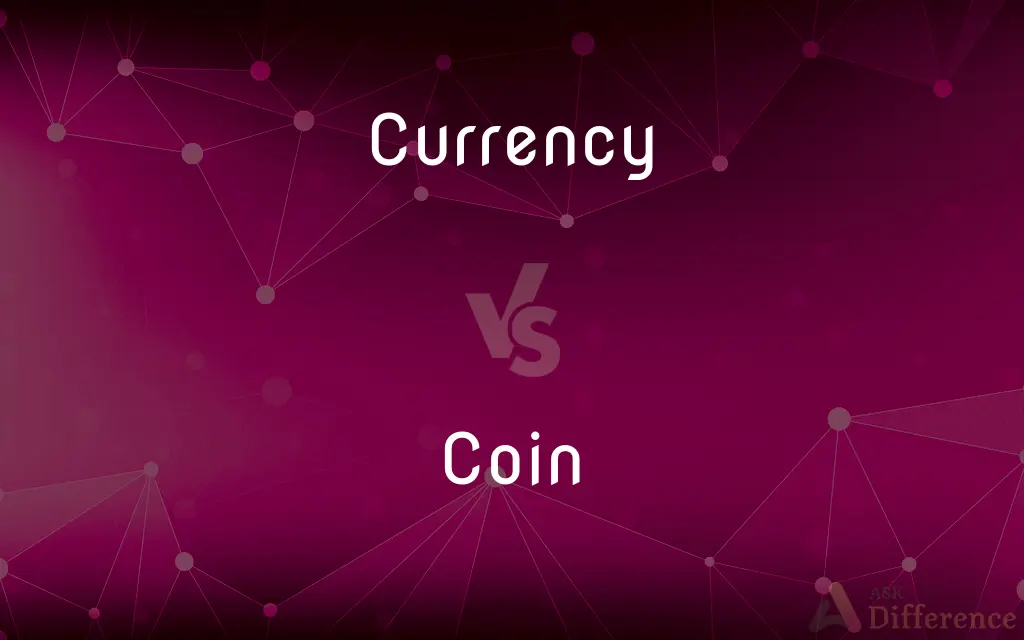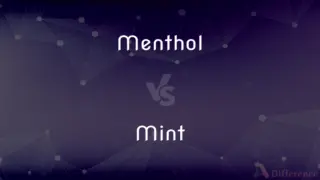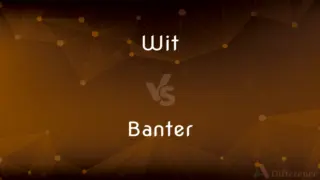Currency vs. Coin — What's the Difference?
Edited by Tayyaba Rehman — By Maham Liaqat — Updated on March 10, 2024
Currency refers to the system of money in general use in a particular country, encompassing both paper money and coins, while coin specifically refers to pieces of metal authorized by government as money.

Difference Between Currency and Coin
Table of Contents
ADVERTISEMENT
Key Differences
Currency encompasses the entire monetary system of a country, including both banknotes (paper money) and coins, serving as a medium of exchange for goods and services. Coins, on the other hand, are a form of currency made typically from metal, issued by the government, and stamped with a design to denote its value.
While currency serves as a broad term for all types of money circulating within an economy, coins represent just one physical form of currency, alongside banknotes. Coins are usually used for lower-value transactions due to their durable nature and ease of handling for small purchases, whereas currency, in its wider context, facilitates all types of economic transactions, both large and small.
Coins have a long history, dating back to ancient civilizations, as a physical form of money that carries intrinsic value based on their metal content. In contrast, the concept of currency is more encompassing and has evolved to include not just tangible money like coins and notes but also digital forms of money and electronic transactions in modern economies.
The production of coins involves minting, a process that includes designing, engraving, and stamping metal to produce money recognized for use in transactions. Currency management, however, covers a broader scope, including the printing of banknotes, minting of coins, and regulation of digital transactions, overseen by a country's central bank or monetary authority.
While coins are a specific type of currency characterized by their metallic composition and physical minting process, currency represents the entire system of money, both physical and digital, used within an economy.
ADVERTISEMENT
Comparison Chart
Definition
The system of money in general use in a particular country.
A piece of metal issued by government as money.
Forms
Includes paper money, coins, and digital transactions.
Specifically refers to metallic money.
Usage
Facilitates all economic transactions.
Typically used for lower-value transactions.
Value
Can represent a wide range of values.
Often denotes lower denominations.
Production
Involves printing of banknotes and minting of coins.
Involves the minting process, including designing and engraving.
Historical Context
Evolved to include digital forms of money.
Dates back to ancient civilizations as a physical form of money.
Regulation
Managed and regulated by a country's central bank.
Issued and authorized by government authority.
Compare with Definitions
Currency
Medium of exchange for goods and services.
Currency exchange rates fluctuate daily.
Coin
Has a long historical use as money.
Ancient civilizations used gold and silver coins for trade.
Currency
Regulated by national authorities.
The Federal Reserve manages the currency in the U.S.
Coin
Carries intrinsic value based on metal.
Some coins are valued more for their metal than their face value.
Currency
Facilitates national and international trade.
Foreign currencies are exchanged in global markets.
Coin
Minted by government authority.
The U.S. Mint produces all U.S. coins.
Currency
General term for money in use.
The U.S. dollar is the official currency of the United States.
Coin
Metallic form of money.
Quarters, dimes, and nickels are coins used in the U.S.
Currency
Includes digital and physical forms.
Digital currencies like Bitcoin have become more popular.
Coin
Used for lower-value transactions.
Parking meters often require coins for payment.
Currency
A currency in the most specific sense is money in any form when in use or circulation as a medium of exchange, especially circulating banknotes and coins. A more general definition is that a currency is a system of money (monetary units) in common use, especially for people in a nation.
Coin
A small piece of metal, usually flat and circular, authorized by a government for use as money.
Currency
A system of money in general use in a particular country
Travellers cheques in foreign currency
The dollar was a strong currency
Coin
A coin is a small, flat, (usually, depending on the country or value) round piece of metal or plastic used primarily as a medium of exchange or legal tender. They are standardized in weight, and produced in large quantities at a mint in order to facilitate trade.
Currency
The fact or quality of being generally accepted or in use
The term gained wider currency after the turn of the century
Coin
A flat disc or piece of metal with an official stamp, used as money
She opened her purse and took out a coin
Gold and silver coins
Currency
Money in any form when in actual use as a medium of exchange, especially circulating paper money.
Coin
Make (coins) by stamping metal
Guineas and half-guineas were coined
Currency
Transmission from person to person as a medium of exchange; circulation
Coins now in currency.
Coin
Invent (a new word or phrase)
He coined the term ‘desktop publishing’
Currency
General acceptance or use; prevalence
The currency of a slang term.
Coin
Metal money considered as a whole.
Currency
The state of being current; up-to-dateness
Can you check the currency of this address?.
Coin
A flat circular piece or object felt to resemble metal money
A pizza topped with coins of pepperoni.
Currency
Money or other items used to facilitate transactions.
Wampum was used as a currency by Amerindians.
Coin
A mode of expression considered standard
Two-word verbs are valid linguistic coin in the 20th century.
Currency
Paper money.
Coin
Variant of quoin.
Currency
The state of being current; general acceptance or recognition.
The jargon’s currency.
Coin
To make (pieces of money) from metal; mint or strike
Coined silver dollars.
Currency
(obsolete) Current value; general estimation; the rate at which anything is generally valued.
Coin
To make pieces of money from (metal)
Coin gold.
Currency
(obsolete) fluency; readiness of utterance
Coin
To devise (a new word or phrase).
Currency
A continued or uninterrupted course or flow like that of a stream; as, the currency of time.
Coin
Requiring one or more pieces of metal money for operation
A coin washing machine.
Currency
The state or quality of being current; general acceptance or reception; a passing from person to person, or from hand to hand; circulation; as, a report has had a long or general currency; the currency of bank notes.
Coin
(money) A piece of currency, usually metallic and in the shape of a disc, but sometimes polygonal, or with a hole in the middle.
Currency
That which is in circulation, or is given and taken as having or representing value; as, the currency of a country; a specie currency; esp., government or bank notes circulating as a substitute for metallic money.
Coin
A token used in a special establishment like a casino.
Currency
Fluency; readiness of utterance.
Coin
(figurative) That which serves for payment or recompense.
Currency
Current value; general estimation; the rate at which anything is generally valued.
He . . . takes greatness of kingdoms according to their bulk and currency, and not after intrinsic value.
The bare name of Englishman . . . too often gave a transient currency to the worthless and ungrateful.
Coin
Money in general, not limited to coins.
She spent some serious coin on that car!
Currency
The metal or paper medium of exchange that is presently used
Coin
(card games) One of the suits of minor arcana in tarot, or a card of that suit.
Currency
General acceptance or use;
The currency of ideas
Coin
A corner or external angle.
Currency
A current state of general acceptance and use
Coin
A small circular slice of food.
Currency
The property of belonging to the present time;
The currency of a slang term
Coin
A cryptocurrency; a cryptocoin.
What's the best coin to buy right now?
Coin
To make of a definite fineness, and convert into coins, as a mass of metal.
To coin silver dollars
To coin a medal
Coin
(by extension) To make or fabricate (especially a word or phrase).
Over the last century the advance in science has led to many new words being coined.
Coin
To acquire rapidly, as money; to make.
Coin
A quoin; a corner or external angle; a wedge. See Coigne, and Quoin.
Coin
A piece of metal on which certain characters are stamped by government authority, making it legally current as money; - much used in a collective sense.
It is alleged that it [a subsidy] exceeded all the current coin of the realm.
Coin
To make of a definite fineness, and convert into coins, as a mass of metal; to mint; to manufacture; as, to coin silver dollars; to coin a medal.
Coin
To make or fabricate; to invent; to originate; as, to coin a word.
Some tale, some new pretense, he daily coined,To soothe his sister and delude her mind.
Coin
To acquire rapidly, as money; to make.
Tenants cannot coin rent just at quarter day.
Coin
To manufacture counterfeit money.
They cannot touch me for coining.
Coin
A metal piece (usually a disc) used as money
Coin
Of phrases or words
Coin
Form by stamping, punching, or printing;
Strike coins
Strike a medal
Common Curiosities
What is the difference between currency and coin?
Currency is the overall system of money, including coins, paper money, and digital forms, while coin specifically refers to metallic money authorized by a government.
How do governments regulate currency?
Governments regulate currency through central banks or monetary authorities that manage its production, distribution, and anti-counterfeiting measures.
Why are coins considered durable?
Coins are made from metal, making them more durable than paper money and resistant to wear and tear.
What makes coins valuable?
Coins carry value assigned by the issuing government, and some may also have intrinsic value based on their metal content.
Can currency exist in digital form?
Yes, currency includes digital forms and electronic transactions in modern economies.
How is the value of currency determined?
The value of currency is influenced by factors like economic stability, inflation rates, and supply and demand dynamics.
What is the process of minting coins?
Minting involves designing, engraving, and pressing metal to produce coins with specific denominations and designs authorized by the government.
What role do coins play in the economy?
Coins facilitate lower-value transactions and are an essential part of the physical money supply in circulation.
Are all forms of currency equally accepted?
Acceptance varies; while all legal tender is officially accepted for debts, digital currencies may not be universally accepted for all transactions.
Has the use of coins declined?
While the use of digital payments has increased, coins remain in circulation for small transactions and collection purposes.
Share Your Discovery

Previous Comparison
Menthol vs. Mint
Next Comparison
Wit vs. BanterAuthor Spotlight
Written by
Maham LiaqatEdited by
Tayyaba RehmanTayyaba Rehman is a distinguished writer, currently serving as a primary contributor to askdifference.com. As a researcher in semantics and etymology, Tayyaba's passion for the complexity of languages and their distinctions has found a perfect home on the platform. Tayyaba delves into the intricacies of language, distinguishing between commonly confused words and phrases, thereby providing clarity for readers worldwide.














































